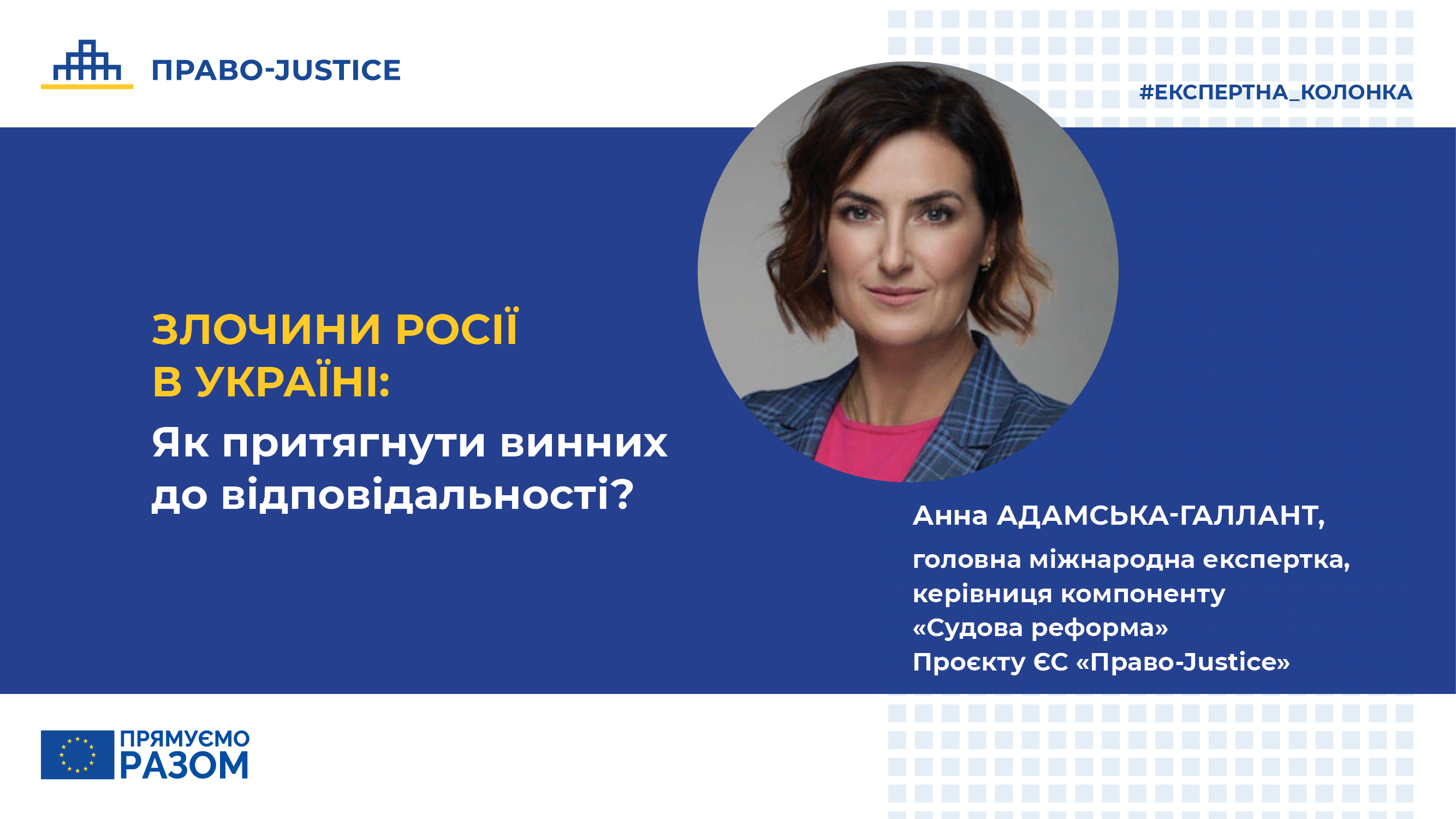Russia’s Crimes in Ukraine: How to Bring the Culprits to Justice? Blog by Anna Adamska-Gallant for NV.ua
 The official statistics say that during the period of the full-scale military invasion of Ukraine, by the Russian Federation, some 90 thousand war crimes and crimes of aggression have been recorded.
The official statistics say that during the period of the full-scale military invasion of Ukraine, by the Russian Federation, some 90 thousand war crimes and crimes of aggression have been recorded.
Unfortunately, with every new day of the war, their number continues to grow. We also have the first sentences for this category of crimes. Thus, as of mid-March of this year, Ukrainian prosecutors submitted indictments before the court in respect of 105 persons; 29 of them received a sentence. That is, the process has started. Of course, this number could be much higher. Under what conditions?
One should understand that, given the huge number of war crimes committed in Ukraine, the majority of such cases will be tried at the national level, and only the most high-profile case – against political and military leaders – will be considered before international judicial institutions. In the light of above, Ukraine needs, more than ever, to harmonize its national legislation with international criminal law — main global tool that allows bringing the guilty to justice for committed international crimes. First of all, such harmonization is needed to ensure the admissibility of evidence for effective investigation of such cases, because it is difficult, and in some cases simply impossible in the absence of an appropriate legal basis. It will also help to eliminate numerous shortcomings of Ukrainian criminal legislation, which should be as clear and precise as possible. In addition, the harmonization is also needed for prompt receipt of international legal assistance by Ukraine.
I should remind here that the Constitution of Ukraine (Article 9) says that treaties which are in force, agreed to be binding by the Verkhovna Rada of Ukraine, are part of the national legislation of Ukraine. As of today, Ukraine has not ratified or implemented the Rome Statute of the International Criminal Court yet, although it undertook this obligation when the Association Agreement with the EU was signed (2014). The Rome Statute contains the most comprehensive list of international crimes, and this would help Ukrainian judges and prosecutors when working with relevant cases. At the same time, Ukraine partially recognizes the jurisdiction of the ICC over the Maidan cases (2014) and over crimes against humanity and war crimes committed on its territory (2015).
It is also worth mentioning the draft law on amendments to certain legislative acts of Ukraine on the implementation of norms of international criminal and humanitarian law. This is a powerful document, the rules of which will increase the effectiveness of investigation and trial of relevant cases. Unfortunately, this draft law is currently awaiting the President’s signature.
At the same time, one shall be aware that the path of justice can be long and challenging. No state in the world could be able to fully ensure the investigation of all committed war crimes in the context of an ongoing conflict. No system is ready to handle such a tremendous number of cases. For example, some cases of war crimes committed in the territory of the former Yugoslavia are still being tried by the courts, even though more than two decades have passed since the end of hostilities.
Thus, in addition to the problem of harmonizing national legislation with international criminal law, there are other challenges when considering war crimes cases. First of all, it is a lack of personnel in the judicial system, which currently amounts to about 30%. The competition-based formation of the High Qualification Commission of Judges, with involvement of international experts, being completed, it should start the process of filling the judicial corps. There is also the issue of infrastructure being purposefully destroyed by Russian forces; security when cases are being heard even during air alerts; and a whole host of other issues, including those related to collection of evidence.
Besides, the human factor should be taken into account, because the war continues. It seems that there is not a single Ukrainian citizen who would not suffer from its consequences. Every day we learn about new attacks on peaceful Ukrainian cities and see people dying. Those who administer justice – judges, prosecutors, and investigators, are no exception. Many of them have also lost relatives, property, and were forced to leave their homes.
Ukraine is a democratic state that today defends European values – the ideals of freedom, equality, and the rule of law – at the cost of great sacrifices. They are something that distinguishes your country from the aggressor. In order to maintain high standards of justice, it is necessary to facilitate an impartial and fair trial of war crimes cases, no matter who they concern. This is the challenge to which Ukraine needs to respond properly, ensuring the spread of the presumption of innocence, as well as the right to defense, even for the Russian soldiers.
There is clearly enormous public pressure for swift and severe punishments. Quite often, not only judges, but also lawyers of persons suspected of committing war crimes end up under pressure. They face stigmatization due to the fact that they were assigned to protect the military of the armed forces of the Russian Federation. No doubt, Ukraine will win the war against Russia, so it is extremely important to demonstrate that Ukraine’s judicial system can also provide a fair trial to everyone, rather than “victor’s justice”.
Anna Adamska-Gallant, Lead of the Judiciary Component, EU Project Pravo-Justice in Ukraine, specially for NV.ua